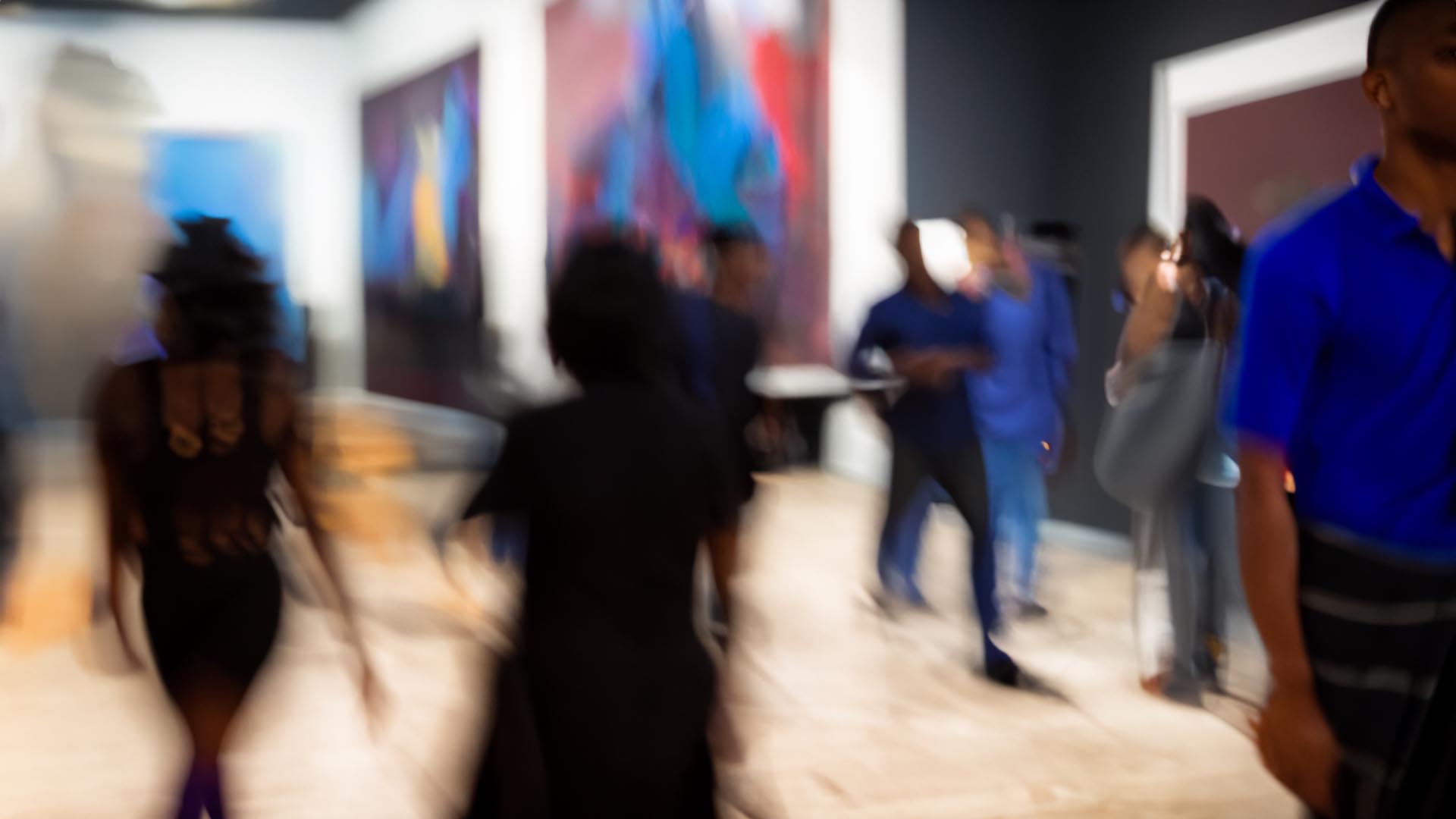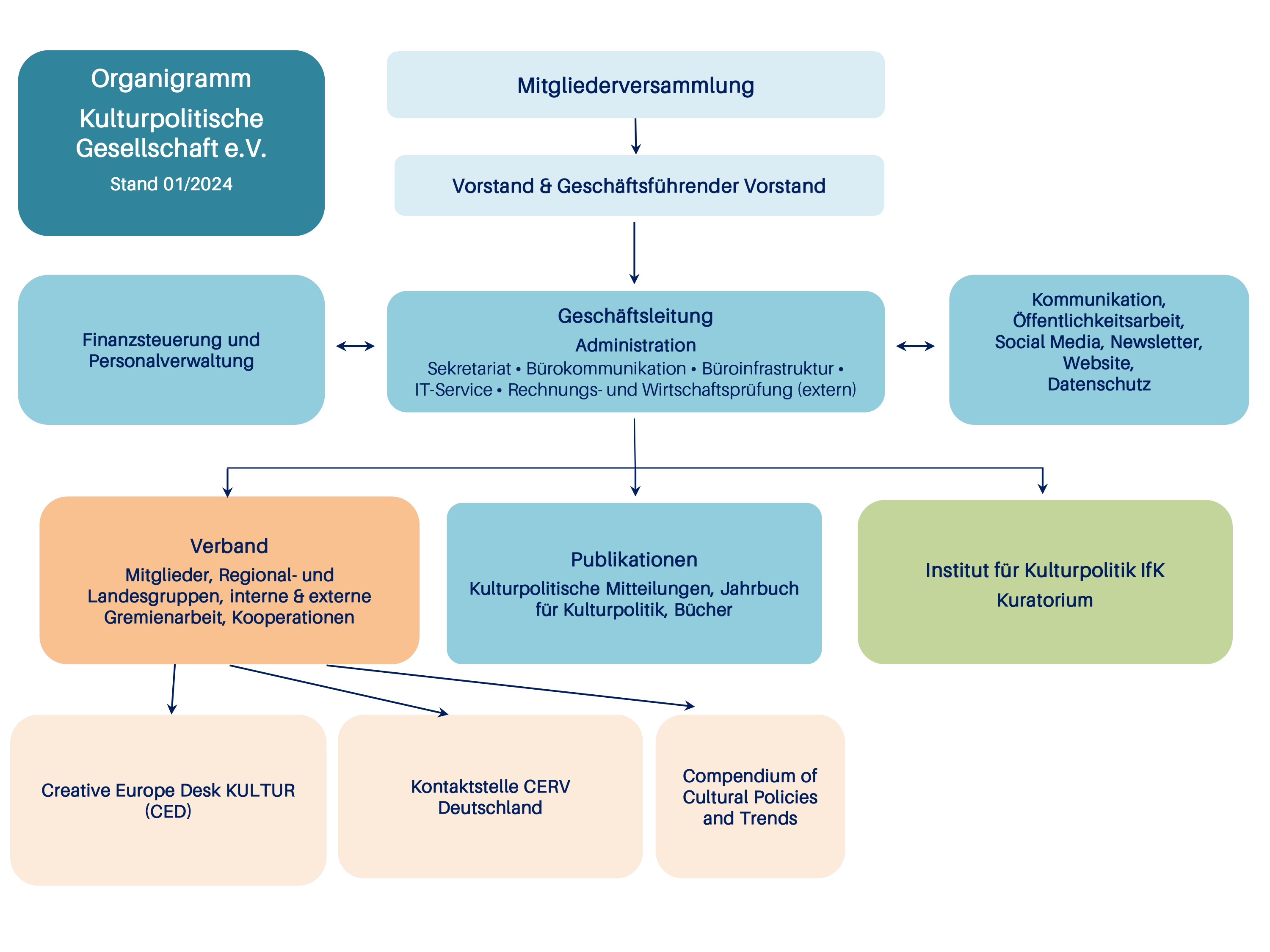The
KuPoGe

The Association for Cultural Policy was founded in 1976 and is the platform for cultural policy discourse in theory and practice in Germany.
The KuPoGe is a network and association of around 1,500 people and organisations interested in and committed to cultural policy from the fields of cultural policy and administration, cultural practice, science, art, cultural education and training, socioculture and journalism, among others.
It is responsible for the Institute for Cultural Policy (IfK) and two national contact points for EU funding programmes – the contact point for the »Citizens, Equality, Rights and Values« (CERV) funding programme and the Creative Europe Desk KULTUR (CED). It is also currently coordinating the European Compendium for Cultural Policies and Trends.
Goals and
Tasks
KuPoGe is committed to a publicly accountable, democratic cultural policy that is actively shaped at all political levels, ensures cultural diversity and artistic freedom and enables as many people as possible to access and participate in art and culture.
To this end, it provides impetus for reform processes, drafts guiding principles and objectives for cultural policy together with stakeholders from the arts, culture and cultural policy and contributes to their conceptual design.
Main areas of work
- Intensification of cultural policy discussion and exchange
- Communicating and discussing information and professional perspectives through publications and events
- Qualification and profiling of cultural policy and cultural policy research
- Preparation of scientific expertise, stocktaking and research commissions
Activities and services
KuPoGe develops digital and analogue exchange formats that create spaces for discussion and exchange, such as KuPoGe conferences, e.g. the biennial Federal Cultural Policy Congress, or the thematic summer/autumn academies are effective forums for cultural policy discussion in Germany.
In the KuPoGe regional and state groups, members have the opportunity to exchange experiences, network and help shape regional cultural policy. They are an important base and seismograph of national political activity.
KuPoGe publishes the quarterly journal »Kulturpolitische Mitteilungen«, the »Jahrbuch für Kulturpolitik« and the publication series »Edition Umbruch. Texte zur Kulturpolitik« series. Podcasts and web talks are available online and focus on current topics. Members also receive the members’ newsletter. In addition, we provide information about the association’s current activities in our newsletter every two weeks.
The cultural policy information system KIS offers online databases with a comprehensive bibliography, chronicle and conference calendar.
The Creative Europe Desk CULTURE is the official national contact point for cultural funding from the European Union. The contact point provides information and advice on the EU funding programme Creative Europe CULTURE.
The CERV Germany contact point provides advice and information on the European Union’s »Citizens, Equality, Rights and Values« (CERV) funding programme.
Organisation chart
with contact points
Statutes and
policy programme
KuPoGe is committed to a publicly accountable, democratic cultural policy that is actively shaped at all political levels, ensures cultural diversity and artistic freedom and gives as many people as possible access to art and culture.
Our
history
The KuPoGe was founded in Hamburg in 1976 as a nationwide association for the development of cultural policy and has been based in the federal city of Bonn since 1996, after stops in Bonn, Cologne and Hagen.
The beginning
The founding and development of the association were determined by the motive of bringing the reformist political commitment of the 1970s (keyword: »Daring more democracy«) to bear in the cultural sector. The names Hermann Glaser, Hilmar Hoffmann, Olaf Schwencke, Alfons Spielhoff and others, who were also the initiators of the Kulturpolitische Gesellschaft, stood for this at the time.


The development
A structural peculiarity of the cultural sector was also decisive for the founding initiative of the association: due to the federalist structure of the distribution of competences and the sectoral system, there was no overarching exchange of experiences and hardly any programmatic debates that could have given cultural policy as a whole a profile. This shortcoming was to be countered by the formation of an independent forum as a neutral level alongside the spheres of interest of cultural policy, administration and the cultural scene.
KuPoGe in figures
| 1976 | Foundation of the Kulturpolitische Gesellschaft on 10 June in Hamburg-Altona |
|---|---|
| 1977 | Publication of the first issue of »Kulturpolitischen Mitteilungen« (published four times a year since then) and first joint cultural policy colloquium with the Protestant Academy |
| 1978 | Publication of the first title in the »Dokumentationen« series |
| 1981 | Call for the foundation of the German Cultural Council; after its foundation: Membership in the Council for Socioculture and Cultural Education |
| 1986 | Initiative to found the Fonds Soziokultur e.V. and participation in the fund’s committees from 1988 until today |
| 1990 | Establishment and operation of an office for the new federal states in Berlin (until 1994) |
| 1993 | Establishment of the publication series »Edition Umbruch. Texte zur Kulturpolitik« |
| 1996 | Relocation of the office from Hagen to the Haus der Kultur in Bonn and establishment of the Institute for Cultural Policy |
| 1997 | Farewell to the founding chairman Dr Olaf Schwencke and election of the new president Dr Oliver Scheytt |
| 1998 | Adoption of a new cultural policy programme |
| 2000 | Start of funding for the Institute for Cultural Policy by the Federal Government Commissioner for Culture and Media (BKM) |
| 2001 | Organisation of the first Federal Cultural Policy Congress »kunst.macht.kulturpolitik.« and publication of the first »Jahrbuchs für Kulturpolitik« |
| 2004 | Cultural Contact Point (CCP), since 2014 under the name Creative Europe Desk KULTUR (CED), becomes the legal entity of the Kulturpolitische Gesellschaft |
| 2008 | Establishment of the Contact Point Germany »Europa für Bürgerinnen und Bürger« (KS EfBB) (since 2022 CERV) |
| 2012 | Discussion and adoption of a new policy programme |
| 2018 | Election of the new President Dr Tobias J. Knoblich and farewell to the previous President Prof Dr Oliver Scheytt |
| 2026 | 50th anniversary of the association |
Funding and funding organisations
The Kulturpolitische Gesellschaft is financed by membership fees and advertisements as well as funding from the federal government, the state of NRW and EU funds.
